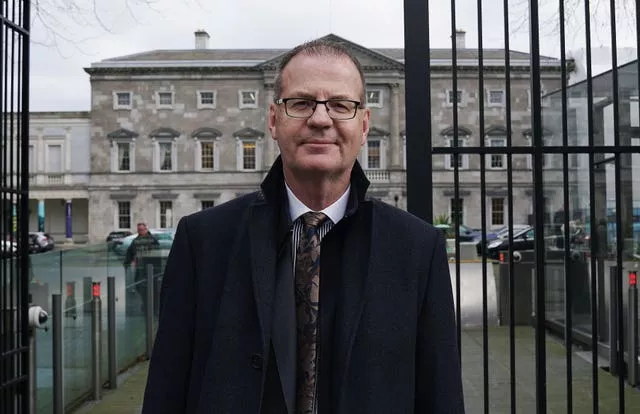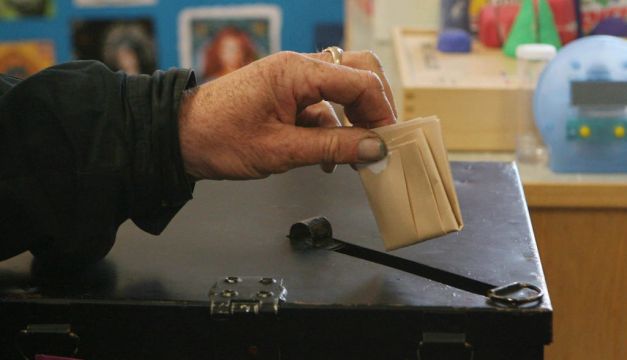The head of the State’s independent electoral commission said he is “encouraged” by how social media companies plan to tackle misinformation and disinformation ahead of the European elections.
Art O’Leary, chief executive of An Coimisiún Toghcháin, told the Joint Oireachtas Committee on European Union Affairs that he is “very happy” with the level of engagement from major tech companies over its plans to remove damaging material during elections.
In June, Ireland and other EU member countries will take to the polls to elect politicians to the European Parliament.
Mr O’Leary said he has held meetings with Meta, TikTok, X (formerly Twitter), Google and Technology Ireland about online issues, adding they have a good working relationship.

He told committee members that the electoral commission has been given “safe channels” to social media giants in order to deal with urgent matters.
“I am encouraged by the level of responsibility they have shown in relation to how they’re going to deal with that [misinformation and disinformation]. They’re very, very conscious that their platforms are a place where quite serious damage can be done to democracy,” Mr O’Leary said.
“I have been pleased by the attitude and respect that they have shown to us and to the process as part of that conversation.
“These are not easy meetings for any of us because we have particular requirements but I’m very, very happy with the level of engagement.
“I asked them what are their plans and arrangements for dealing with mis- and disinformation on the platform in an electoral context. And they have all laid out their procedures, their processes, how they engage and investigate allegations of mis and disinformation.
“I also asked for a safe, clean passage into the organisations quickly if we need speed to be able to do something.”
He also said he raised issues around algorithms.
“Interestingly, if there is something that they’re not clear about, if any issue was being investigated for mis- and disinformation, they can reset the algorithms to make sure that the post doesn’t appear on people’s timelines or appears so far down as to be unreadable.
“There are many ways of dealing with this.”
Sinn Féin’s Ruairí Ó Murchú said there is a “huge body” of work to do to ensure the spread of misinformation and disinformation is contained.
He added: “We’ve all entered into a world where anyone can post whatever has entered their head at 12 o’clock at night after a couple of bottles of beer, possibly a couple of bottles of wine.
“But then you have you have other players that are not so benign, and they can be state-actors and they can be non-state-actors. They can be absolutely disorganised, just that there’s a lot of them, so that is a particular problem.”
Mr O’Leary said his biggest concern is around misinformation about the electoral process.
“It’s the [allegations] that the electoral register is rigged, that your vote won’t count because all those ballot boxes will be taken away and put in the boot of a car because they all know they’re voting for somebody, you must write on the ballot paper, etc, etc,” he added.
“That’s the bit where we can make a real impact because that tends to be much more black and white.”
He urged the public to treat each day like it is April Fool’s Day and question who is passing on the information, how do you know if it is true and whether it is a trusted source.
Mr O’Leary said that while the body has been given extensive powers in the Electoral Reform Act 2022 in relation to misinformation and disinformation, the powers have not yet been commenced by the Minister for Housing, Darragh O’Brien.
He said that the Electoral Commission currently has no regulatory investigative or sanctioning powers in the area of misinformation and disinformation.
“What we do have is the obligation to inform citizens about the elections. And one is the electoral process information,” Mr O’Leary added.
“We are very conscious of the right to freedom of expression in this country and this is a constitutional right, but we’re also conscious that we have an obligation that our citizens and the electorate have the right to be informed properly as well.
“The way that misinformation/disinformation is leaked into the environment now is becoming increasingly sophisticated and increasingly complex.

“We have to be ready to be able to deal with that. So we are building an organisation right now from scratch, which is versatile, which is flexible, which is responsive and aware of developments in the area.”
There are currently 25 people working in the organisation, across three sections, including electoral operations, electoral integrity, and corporate services.
Mr O’Leary said their ambition is to double staff numbers by the end of the year.
“[We] have a huge role in relation to monitoring and correcting and labelling and responding to any myths or disinformation that we see, particularly around electoral process information.
“So, ‘such and such a polling station has burnt down’, ‘if you write your name on a ballot paper you win a prize’ – this kind of stuff is easily corrected.
“Media literacy is important here to explain to people about trusted sources of information, but we also have a big job to do and we also have the collaboration of a number of stakeholders in this country as well.”
Following the commission’s campaign to boost electoral registration numbers, Mr O’Leary said that 100,000 people have registered for the first time, while a further 100,000 people updated their details in the last five months.







